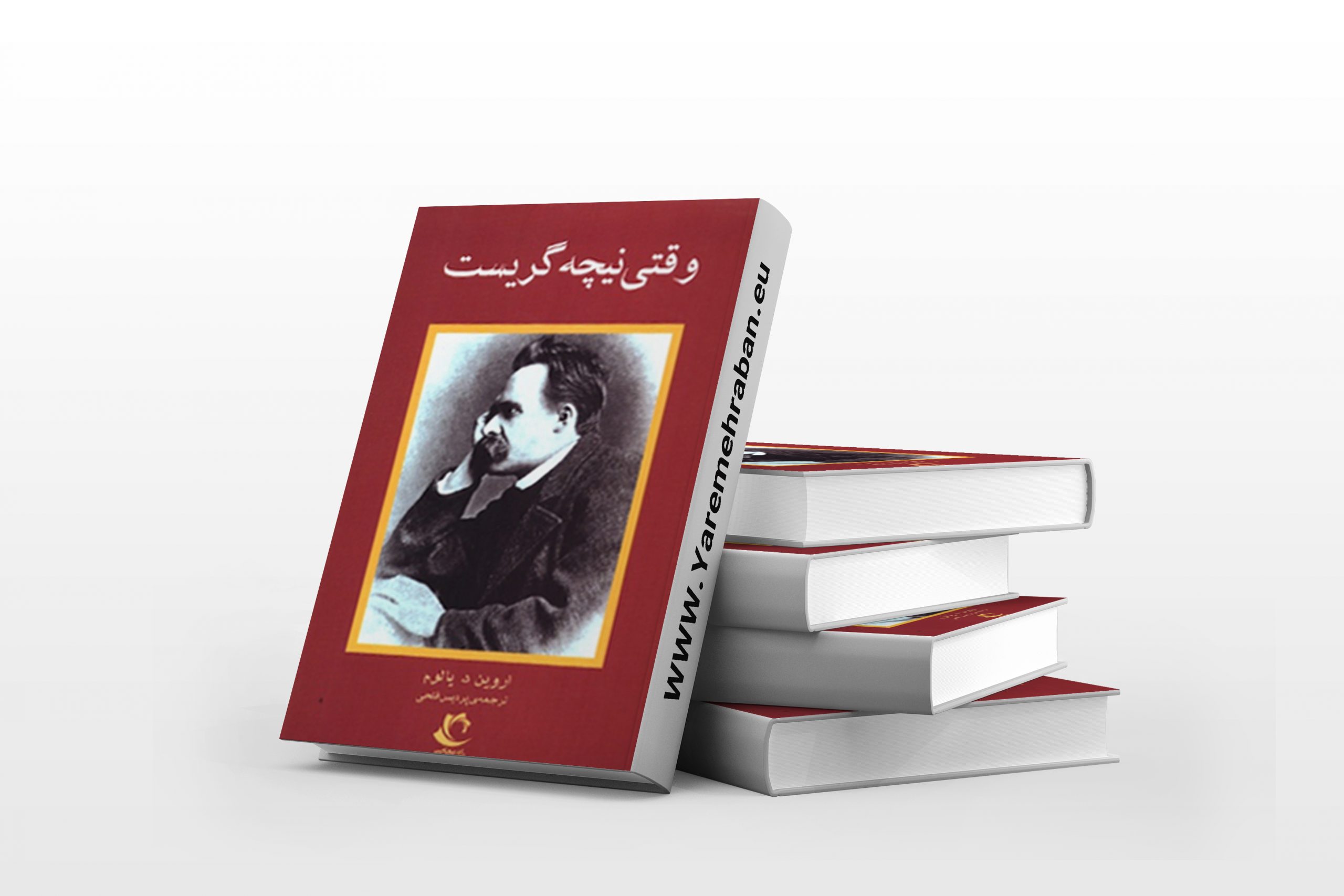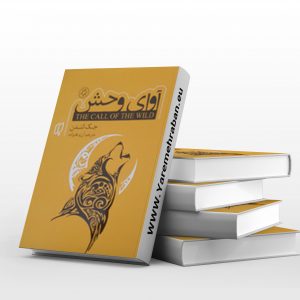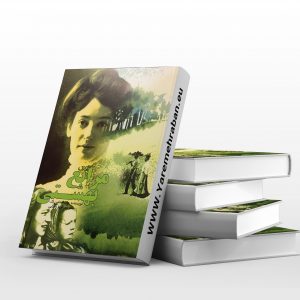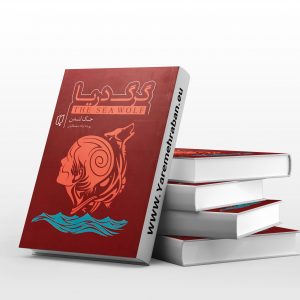Description
When Nietzsche Wept by Dr. Erwin d. Yalom is a professor of psychiatry at Stanford University, an existentialist therapist and psychotherapist.
During this educational novel, Ervin Yalom describes the common treatments for obsessive-compulsive disorder that somehow affect both of the novel’s main characters.
But in the end, it is the existential psychotherapy and the physician-patient relationship that the book seeks to introduce more than anything else.
Theodore Rosak, author of Corso’s book on Yalom and his novel, writes: When Nietzsche wept after the executioner of love, it was a step forward for Erwin Yalom. He expresses deep human thoughts in the envelope of a unique story. What more could you ask for?
Much has been written about the novel When Nietzsche Wept. The Boston Globe writes: This book is a meticulous research and a clever and imaginative novel. The Washington Post writes about this book: “A powerful and authoritative book! “Surprise lies in the magical and shocking moment.”
On the back cover of the book is:
When Nietzsche wept is a mixture of reality and fantasy, a manifestation of love, destiny and will in nineteenth-century rational Vienna and on the eve of the birth of psychoanalytic knowledge.
Friedrich Nietzsche, Europe’s greatest philosopher, Joseph Brewer, one of the founders of psychoanalysis and a young medical student named Sigmund Freud, are all intertwined in the structure of the novel to create the unforgettable epic imaginary connection between the extraordinary illness and the exceptional healing.
Some of Ervin d. یالوم
Spinoza Problem Book
The book of lying on the sofa
Mom’s book and the meaning of life
Schopenhauer’s treatment book
Becoming my book
Book of Yalom readers
Among the books of Yalom, my book became the biography of Ervin d. Yalom is his own pen.
In fact, this book is autobiographical. Yalom, who is a professional therapist and always explores the lives of others, in this book explores his own personality and shares the deepest aspects of his life with the audience.
The novel begins with a letter from Lucalome to Josef Brewer, a prominent Austrian physician. A letter written in part: The future of German philosophy is in danger.
By sending this letter and drawing Dr. Brewer’s attention, Losalome will meet with him to discuss Professor Nietzsche and the future of German philosophy. The future is at stake because of Nietzsche’s disease.
The death of this man may have serious consequences: for you, for European culture, for all of us. believe it.
Losalome, who claims to be responsible for Nietzsche’s illness, asks Dr. Brewer to accept Nietzsche’s treatment.
Nietzsche’s body and mind are sick, and Losalome believes that Nietzsche is more frustrated than anything else and may commit suicide in the near future.
Dr. Brewer, who faces various challenges in his life, has come to Venice to compensate for the damage that a beautiful woman has done to his life, but in Venice, he is caught again by the beautiful Lucalome, who asks him for help.
Brewer, of course, knows that treating despair is not his specialty, and it seems unlikely that he can help Nietzsche.
Miss Salome, there is no medicine to cure despair and no medicine to cure the soul.
But Lucalome is aware of Brewer’s medical background and what he has done, and asks him to help Nietzsche with the “speech therapy” experimental method he has already tried once.
Losalome finds this method useful in treating Nietzsche’s despair, and with her unusual beauty she convinces Dr. Brewer to meet with Nietzsche.
Nietzsche, on the other hand, is not one to easily accept help. He is an isolated and very arrogant man who has very strong opinions about weakness and strength.
Nietzsche is extremely sensitive to the issue of power and is not willing to be in a position to be forced to delegate his power.
In philosophy he is inclined to the Greeks before Socrates, especially their conception of the concept of conflict.
The belief that every person will achieve what is inherent in him / her only through struggle. Nietzsche is deeply distrustful of the motives of those who stay out of the conflict and claim sacrifice. His guide in this category is Schopenhauer.
He believes that there is no such thing as helping another, but that everyone wants to dominate the other and increase his authority.
Nietzsche’s encounter with this strong mindset with Dr. Brewer, who at Lucalome’s insistence agreed to meet with Nietzsche, is the main theme of the novel, but there are other themes in the book.
Dr. Brewer’s meetings with Freud are another interesting part of the novel.
Most of the characters in this novel and the relationships between them are real, but the story is fictional.
The book is based on a meeting between Nietzsche and Dr. Joseph Brewer, but the two have never met in the real world.
One of the real parts of Nietzsche’s desperate bibliographies to Lucalome is some of them in the book.
The book When Nietzsche cried is one of the most successful books of Yalom, which has been well received in Iran.
A novel that has a very educational aspect and almost any reader can read it and learn from it.
The whole book can be thought of as psychotherapy sessions that revolve around a variety of topics, including the treatment of frustration.
In an excerpt from Yalom’s book My Becoming, it says about the novel’s popularity when Nietzsche cried:
Sales were very good in the United States when Nietzsche cried, but he was not seen at all in the face of the book’s popularity in other countries.
The book was translated into 27 languages, with the largest audience in Germany and the highest reading per capita in Greece. In 2009, the mayor of Vienna named the book Book of the Year.
Every year, the mayor of Vienna introduces a book, publishes hundreds of thousands of copies, and makes them available to the citizens of Vienna free of charge.
The novel When Nietzsche Wept is written in such a way that even if you are not interested in psychotherapy, philosophy, the therapist-patient relationship, obsessions, and the like, you can read and fall in love with it.
But if you are interested in Nietzsche and his philosophy as well as psychotherapy, this book will be amazing for you.
This book reflects some of Nietzsche’s important ideas, but the main issue is the treatment of obsessive-compulsive disorder.
An obsession with both the patient – Nietzsche – and the therapist – Dr. Brewer. An obsession that can occur to anyone in a variety of contexts.
One of the most interesting parts of the book is Dr. Brewer engaging with Nietzsche to treat him. Nietzsche’s powerful character does not accept help. He does not accept the doctor’s sympathetic look and emotional caresses and reacts strongly to them.
On the other hand, Dr. Brewer does not stop trying to help Nietzsche, but what are his motives? Why does he want to cure a patient who does not accept help?
Is Dr. Brewer trying to fulfill his medical duty or does he intend to increase his authority? What is clear is the intellectual difference between Nietzsche and Dr. Brewer, and this intellectual difference is the reason for the beginning of the intellectual war between them.
Nietzsche and Dr. Brewer discuss the subject of helping and other issues such as life expectancy, suicide, mental conflicts, truth, and much to read.
As mentioned, any reader can read and enjoy this novel, but to understand the book more deeply, we need to have a brief overview of Nietzsche’s philosophy, psychotherapy, existential philosophy, and some of Freud’s research.
The concept that is needed to better understand this book is the concept of the superhuman in Nietzsche’s philosophy. The subject is mentioned in the book of Yalomukhawanan as follows:
Nietzsche believes that the path to becoming a superhuman is not to overcome or subjugate others, but to overcome oneself.
A person who is really powerful does not impose suffering, but like Zarathustra, wisdom and power are filled with him and he gives them freely to others.
This generosity stems from personal abundance, not from pity, which is a form of humiliation.
Thus the superhuman affirms life, is the one who loves his destiny and says yes to life.
Nietzsche’s superhuman loves his destiny, accepts resentment and turns it into art and beauty.
In Nietzsche’s view, the superman is one who has overcome the lethargic need for supernaturally imposed goals.
Nietzsche says that when man can do so, he has become a superhuman, a philosophical soul, and one of those who represent the next stage of human evolution.
The concept of a superhuman can be seen in different parts of the book, and I think this is very clear at the end of the book.
Also in different parts of the book, Zarathustra and other Nietzsche books are discussed, which makes the audience attracted to these books.
Finally, The Book When Nietzsche Wept is a readable novel that can save you from the monotony of life and obsessions.
Excerpts from the text of the book When Nietzsche Wept
I hope that the time will come when no man or woman will fall victim to the weakness and helplessness of the other. (The Novel When Nietzsche Wept – Page 36)
Brewer’s clinical examination was thorough and regular. After hearing the words the patient uses to describe his or her illness, he or she examines each symptom in a principled way: how the symptom started, how it has changed over time, and how it has responded to treatment.
The third stage of his work was the study of the function of various organs of the body, which started and ended from the head. (The Novel When Nietzsche Wept – Page 95)
Truth is not holy itself. What is sacred is the search we make to find our truth! Do you know anything more sacred than self-knowledge? (The Novel When Nietzsche Wept – Page 115)
I have always believed that the last reward of the dead is that they will not die! (The Novel When Nietzsche Wept – Page 117)
Just as the skin encloses components such as bones, muscles, intestines, and blood vessels and hides them from the human eye, so is selfishness and pride a cover for the restlessness and excitement of the soul, the skin that is drawn to the human soul. (The Novel When Nietzsche Wept – Page 128)
He placed his hands on both of Nietzsche’s temples and slowly began massaging the entire head and neck, gradually increasing the pressure on the hands.
The focus was on areas that were more painful than elsewhere due to the patient’s response. As he proceeded, Nietzsche shouted and shook his head angrily. But Brewer did not give up and quietly held him in place. (The Novel When Nietzsche Wept – Page 197)
I think the more I express my inner feelings, the more relaxed I become. (The Novel When Nietzsche Wept – Page 239)
Nietzsche split the air three times with a flick of his finger: “Is not it better to create and be graceful before reproducing? Our task in life is to create a superior being, not to produce a lower being. Nothing should interfere with the evolution of your inner hero.
“If lust blocks this evolution, it must be overcome.” (The Novel When Nietzsche Wept – Page 262)
Whoever does not obey himself, another will command him. (The Novel When Nietzsche Wept – Page 263)
Those who seek the truth must leave the peace of mind. (The Novel When Nietzsche Wept – Page 265)
Have you ever wondered who is safe, comfortable and always happy? I answer: Only those who lack enlightenment: ordinary people and children. (The Novel When Nietzsche Wept – Page 266)
Let me tell you about a Buddhist monk I met in Angadan last year. He had a humble life. He spends half of his waking hours thinking and sometimes spending weeks without verbal exchanges with others. His diet was simple: one meal a day, whatever he begged for, sometimes just an apple.
But you think about that apple as if it is bursting with redness, wateriness and brittleness. At the end of the day, he eagerly awaited his meal. (The Novel When Nietzsche Wept – Page 321)
Dostoevsky writes that there are things that should not be said except to friends; There are things that should not be said, even to friends; And finally, there are things that should not even be said to yourself! (The Novel When Nietzsche Wept – Page 335)
Everyone must choose the amount of truth they endure. (The Novel When Nietzsche Wept – Page 395)
To truly communicate with a person, one must first relate to oneself. If we can not embrace our loneliness, we will use the other as a shield against isolation.
Only when one can live like a hawk – without the presence of another – will one be able to love; Only then will another growth become important to him. (The Novel When Nietzsche Wept – Page 398)
Great men have to endure great suffering. (The Novel When Nietzsche Wept – Page 419)
1- Introducing the book on YouTube
2- Introducing the book in Aparat














Reviews
There are no reviews yet.